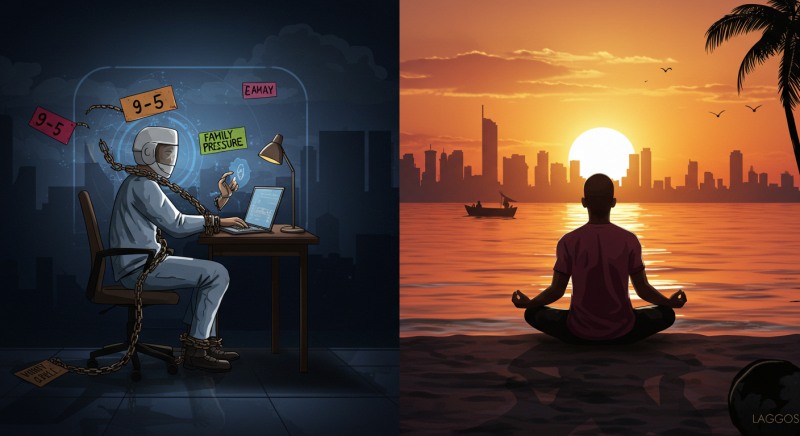It’s 7:30 PM on a Thursday after work. You’re stuck in Lagos traffic, sweating through your ankara blouse, your phone buzzing with 17 unread Slack messages, and your auntie just texted: “Hope you’re coming for the family meeting tomorrow?” Meanwhile, your boss’s latest email reads: “Kindly revert ASAP.” Sound familiar? If you’ve ever felt like a roasted plantain—charred on the outside, mushy on the inside—you’re not alone. A 2022 study by the Nigerian Bureau of Statistics found that 68% of professionals in Lagos and Abuja report chronic work-related stress. But here’s the good news: You don’t have to choose between your hustle and your health. Let’s fix that.

Key Takeaways
– Why “I’ll sleep when I’m dead” is the worst life motto for Nigerian professionals.
– 5 science-backed, Naija-friendly hacks to recharge without losing your job.
– How to say “no” to Auntie’s 4th weekend event without starting a family WhatsApp war.
– The surprising link between suya breaks and productivity (backed by data!).
Why Self-Care Isn’t Just for “Oyinbos”: The Nigerian Work-Life Crisis
Let’s face it: The “hustle harder” mantra isn’t working. While Westerners sip pumpkin spice lattes during “mental health days,” the average Nigerian worker clocks 55 hours weekly (NBS, 2023)—often without overtime pay. Worse, a WHO report reveals that 42% of Nigerians suffer anxiety linked to financial/work pressure. But here’s the kicker: Ignoring self-care isn’t “strength”—it’s a one-way ticket to burnout city.
Step 1: Master the Art of Saying “No” Like a Pro (Without Getting Fired)
Nigerians are famously generous, but your “Yes, sir!” reflex could be killing you. Case in point: A 2023 survey by Jobberman Nigeria found that 73% of employees regularly take on extra tasks out of fear of appearing “lazy.”
Action Plan:
– The “Broken Record” Technique: Next time your boss asks, “Can you handle this report by 6 AM?”
reply: “I’m currently prioritizing [X project]. Should I deprioritize that to focus on this?” (Works like jollof rice at a wedding).
– Family Edition: For Auntie’s impromptu events: “I’ll be there in spirit! Sending *₦5,000* for the *aso ebi*.”

Step 2: The “Detty December” Approach to Daily Breaks (No, Not the Party Kind)
Research from the University of Ibadan shows that 15-minute “microbreaks” boost productivity by 27%—more than a double shot of Nescafé. But how do you recharge when your office has no AC and your “break room” is a danfo bus?
Try This:
– The Suya Break: Grab spicy skewers (protein = brain fuel) and walk for 10 mins.
– Pidgin Meditation: Close your eyes and repeat: “My body no be firewood. I go rest small.” (3x daily).
Step 3: Hack Your Sleep Like a Lagos Landlord Hacks Electricity
Fact: 63% of Nigerian adults sleep <6 hours nightly (National Sleep Foundation). But surviving on garri-level sleep? That’s a scam.
Pro Tips:
– Silence Generators by 10 PM: Use earplugs made from… just buy earplugs.
– The “No Phone After 9” Rule: Unless Burna Boy drops a surprise album, your mentions can wait.
Step 4: Turn Commuting Hell into “Me Time” (Yes, Even in Lagos Traffic)
Spending 3 hours daily in traffic? That’s 390 hours yearly—enough to learn Spanish or start a side hustle!
Survival Kit:
– Podcast Therapy: Swap Fuji music for motivational podcasts like “How to Make Your First Million Without Yahoo Yahoo.”
– Traffic Yoga: Isometric exercises (clench glutes, hold for 30 secs. Steering wheel optional).
Step 5: The “Jollof Rice” Method for Prioritization
Not all tasks are created equal. Treat your to-do list like a pot of jollof: layer what matters most.
Recipe for Success:
1. Rice (Critical Tasks): Client deadlines, health check-ups.
2. Pepper (Important): Family calls, gym time.
3. Maggi (Optional): That 10th office meeting about meetings.
Conclusion: Your Health is the Ultimate “Alert”

Let’s keep it 100: No job is worth your sanity. As the Igbo say, “A tree that burns itself to keep others warm will soon become ash.” Start small—take that suya break, mute the family WhatsApp for a day, and remember: Even Dangote sleeps sometimes.
Final Stats to Motivate You:
– Workers who practice self-care report 31% higher job satisfaction (Forbes, 2023).
– Companies with wellness programs see 20% fewer absences (LinkedIn Workplace Report, 2024).
Sources:
1. Nigerian Bureau of Statistics (2023 Work Stress Report)
2. World Health Organization – Nigeria Mental Health Data
3. University of Ibadan – Microbreaks Study
4. Jobberman Nigeria – Workplace Boundaries Survey
